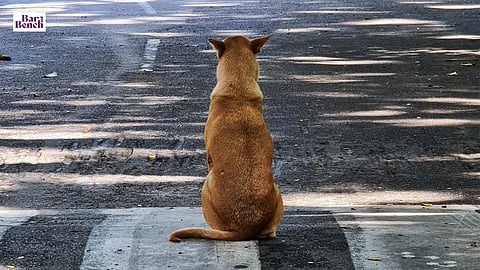
- Latest Legal News
- News
- Dealstreet
- Viewpoint
- Columns
- Interviews
- Law School
- Legal Jobs
- हिंदी
- ಕನ್ನಡ

In an order passed today, the Supreme Court modified its earlier order calling for the rounding up of stray dogs in the Delhi NCR region.
The Court said that the dogs shall be released from dog shelters after being dewormed and vaccinated.
Significantly, the three-judge Bench of Justices Vikram Nath, Sandeep Mehta and NV Anjaria also expanded the scope of the matter pan-India. Similar petitions pending before High Courts across the country stand transferred to the apex court.
"We have expanded the scope pan-India, not only Delhi NCR because there are petitions filed here from other states and in other High Courts also, matters are pending...We have also directed the Registrar General to get details from High Courts on similar pending matters and all those matters to be transferred to this Court so that a final national policy or decision is taken with regard to this problem."
The Court thus impleaded all states and union territories and their relevant authorities and asked them for steps taken to comply with the Animal Birth Control Rules, 2023.
Another interesting move is the direction to dog lovers and NGOs that moved petitions before it to deposit money.
"Each individual dog lover and each NGO that has approached this Court shall deposit a sum of ₹25,000 and ₹2 lakh respectively with the Registry within 7 days, failing which they shall not be allowed to appear in the matter any further. The amounts so deposited shall be utilised in the creation of infrastructure and facilities for the stray dogs..."
Additionally, the Court clarified dogs with aggressive behaviour or with rabies shall not be released into public spaces from dog shelters. Further, the Court maintained that public feeding of dogs shall not be permitted and dedicated feeding spaces will have to be created.
The issue concerning stray dogs has hogged the limelight in the national capital for the past few weeks after the a Bench of Justices JB Pardiwala and R Mahadevan on August 11 ordered municipal authorities in Delhi to begin rounding up stray dogs from all areas, prioritising vulnerable localities, and to establish shelters with an initial capacity of at least 5,000 dogs within eight weeks.
The order prohibited the re-release of dogs back to the streets, mandated sterilisation, immunisation and de-worming, and required that shelters be equipped with CCTV, adequate staff, food and medical care.
It further required the creation of a helpline within a week to report dog bites, capture of offending dogs within four hours of a complaint and publication of monthly rabies vaccination and treatment data. Any obstruction to the exercise was to be treated as contempt of court.
Any obstruction to the exercise by animal activists would be treated as contempt of court.
The Court passed the August 11 order in a suo motu case. It observed that the menace of dog bites violates the fundamental rights of citizens under Articles 19(1)(d) and 21, noting that over 25,000 such cases were reported in Delhi in 2024 and more than 3,000 in January 2025 alone.
The Court in that order also slammed animal activists and cautioned against “virtue signalling” by animal lovers that ignored the core problem.
The order prompted widespread protests by animal rights activists.
[Read Order]